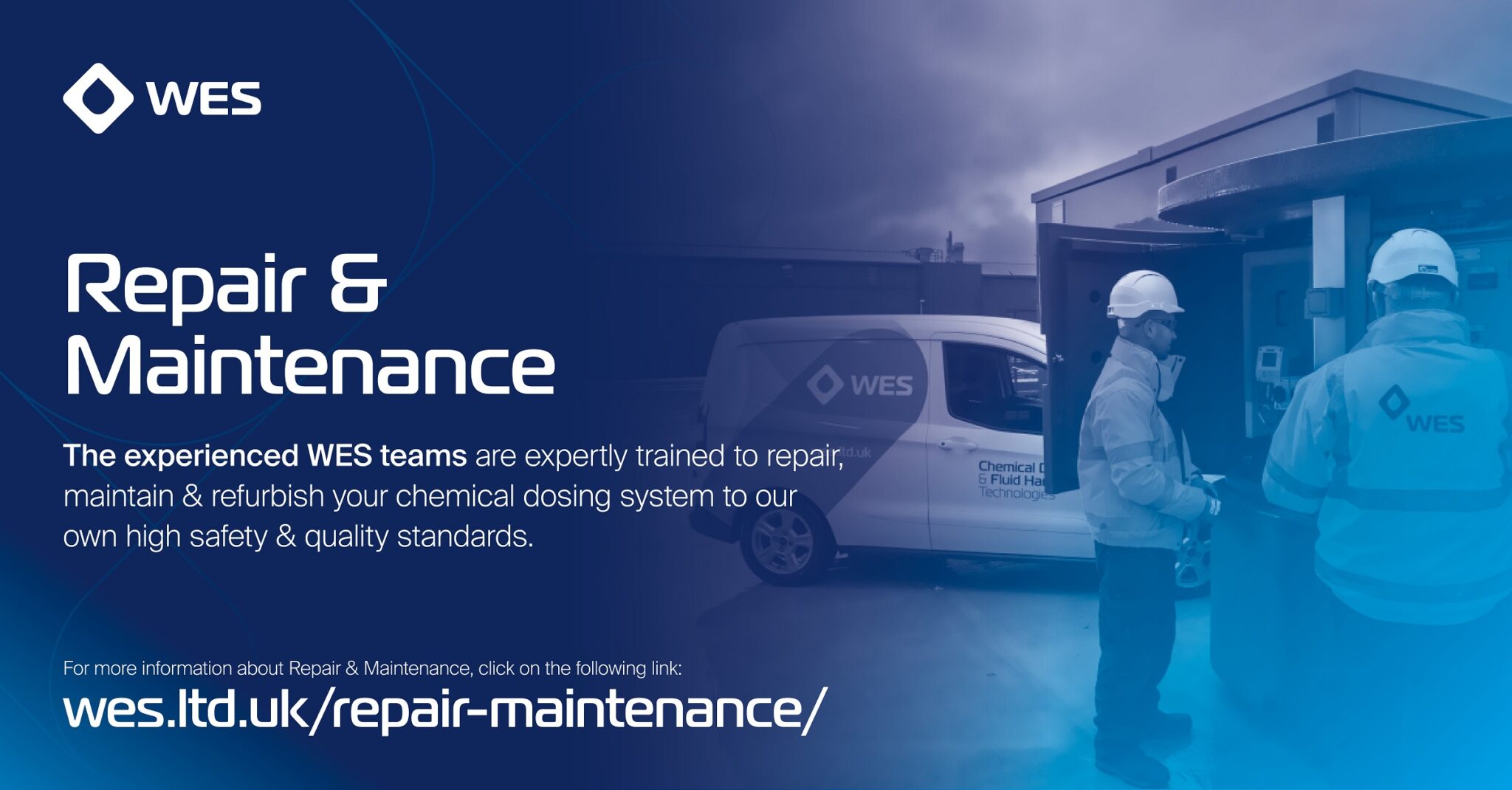The latest in our Player Profiles series introduces you to Materials Controller Stephen Hicks. Stephen joined the team in 2020, bringing with him a wealth of experience from the automotive sector.
Read more in our latest Repair and Maintenance player profile below.
Tell us about yourself
My Name is Stephen Hicks, I joined Wes in August 2020 after previously working within the automotive sector. I live near Basingstoke which is ideal for getting to WES every day. Away from work, I like to spend time walking the family dog Lexi who is a Caliver King Charles Spaniel and who is quite mad. I also like to spend (probably too much) time socialising with friends in the local pub. I also enjoy music & films and spend a fair amount of time online gaming or going racing (much to the annoyance of my wife!).
What is your role in the WES R&M team?
My role with WES is varied, involving procurement & materials management across all the business streams. I strive to ensure that prices are competitive, and that lead times suit our demand where possible. Another key function of my role is to convert estimates & materials schedules into job specific information which allows us to track the cost associated with the projects.
I also look after the stores function within WES, ensuring the smooth running of the stores facility, making sure the stock re-order levels reflect current usage patterns, keeping the stock accurate by managing cycle counts, and correcting any anomalies found.
I can be found in amongst the operations & projects teams in the WES office which allows close collaboration & engagement with the teams – so I’m always available to offer guidance and assistance on part selection/queries.
What do you enjoy most about working at WES?
I very much enjoy the variations of my role – particularly being involved in as many aspects of the WES business as I can. I enjoy learning new processes & enhancing my skills which enables me to continually improve the service I provide.
Everyone here at WES is flexible and as a team, we get everything done. There is a wealth of knowledge that people are only too happy to share. I am fortunate to be given the freedom to develop my role & responsibilities in my own way without too much interference.
What does a typical day look like for you?
Whilst there are numerous “tasks” that I undertake each week, every day is different. This can vary from creating jobs on our SharePoint system, communicating with our suppliers, updating our stock requisition app which we have to enable our teams to request stocked items whilst on the job, and sometimes some “old school” hands-on in the stores. In a nutshell, I make sure we have what we need when we need it.
What are your most & least favourite parts of working for WES?
Every day is a change to learn something new which is great, I’m constantly looking for ways to improve our systems both with logistics and purchasing to make us ready to react to any emergency in the field or internally.
My least favourite, well I do think we missed an opportunity to have installed a jacuzzi, ball pit & soft play area in the office during the building of the new premises.
We asked our Graduate Engineer, Jalen, to give a review of his first 6 months with WES. Here was his take:
I am thrilled to share my journey as a Graduate Engineer at WES over the past six months. Join me as I reflect on the challenges, growth, and incredible experiences in the dynamic world of the water industry.
Background: WES, a leading player in the water sector, has been at the forefront of innovation and sustainability. Joining the team as a fresh graduate was an opportunity I eagerly embraced, and little did I know that the water industry would prove to be a catalyst in shaping my early career.
Initial Challenges: The first few months were a whirlwind of learning and adapting. From understanding the intricate water treatment processes to diving into the sales, and managing customer’s and supplier’s needs, the challenges were thrilling and demanding. However, the robust support system at WES, coupled with the “servant leadership programme” from the wider team, ensured a smooth transition into the professional realm.
Professional Growth: My role has allowed me to work on diverse projects, each presenting unique engineering and clientele challenges. Whether it’s optimising water treatment processes, implementing sustainable solutions, or addressing infrastructure concerns, the opportunities to learn have been abundant. The collaborative environment at WES has fostered an atmosphere of continuous improvement, pushing me to think critically and innovate in the face of real-world challenges.
Adaptability in a Dynamic Industry: The water industry is constantly evolving, driven by technological advancements, (where WES is already at the forefront) and the imperative to address environmental concerns. WES has provided me with exposure to cutting-edge technologies and methodologies, fostering adaptability and a forward-thinking mindset. The industry’s dynamic nature has allowed me to embrace change as an opportunity for personal and professional growth.
Future Prospects: As I look ahead, the water industry promises many exciting opportunities. The blend of environmental consciousness, engineering innovation, and societal impact makes it an ideal space for aspiring professionals. I am eager to continue contributing to WES’s mission of playing a fundamental role in improving the quality of water for communities across the UK.
Next up in the Repair & Maintenance Player Profiles series, we have our Workshop Supervisor Luke Shannon. Luke joined in 2015 as a workshop technician after 11 years of working in aircraft maintenance.
Read more in our latest Repair and Maintenance player profile below.
Tell us about yourself
My name is Luke Shannon and I joined WES in 2015 as a Workshop Technician. Previously I worked in aircraft maintenance for 11 years, mostly in component overhaul. I live in Basingstoke but grew up in the Caribbean and Malaysia. I am the father of 3 daughters and spend much of my time away from work running around after them when I’m not engaged in my hobbies which include: HEMA (Historical European Martial Arts), Bonsai and hiking with friends. I am also a passionate Arsenal fan and run the “WES Super League” fantasy football competition.
What is your role in the WES R&M team?
My role at WES is to supervise and support the day-to-day running of the 2 workshops. This includes, but by no means is limited to: technical support, health and safety instruction and monitoring, plant and equipment maintenance and giving general support to our fantastic team of fitters.
What do you enjoy most about working at WES?
Honestly….it has to be the people and the atmosphere. We have a really great team here and everyone is supportive and helpful. With the servant/leadership model that we have in place at WES, there are no barriers between department and rank which means that everybody has their concerns/ideas and voices heard. WES has managed its growth very well and still maintains the feel of a family-run business.
What does a typical day look like for you?
Dealing with a diverse team and range of products means that there is no such thing as a typical day for me at WES. Some days I’m in and out of meetings, others I can be on the tools all day. Some days I can be glued to my desk all day and others never get a chance to sit down. I’m not complaining because I wouldn’t have it any other way.
What are your most & least favourite parts of working for WES?
My two favourite things at WES are our lovely new building and the support I have received to advance my career. WES supported me last year to attain my lead auditor qualification and this year I have begun studying for my NEBOSH certificate.
My least favourite thing is that people are always bringing cakes and biscuits to work and it’s making me fat.

Next up in the Repair & Maintenance Player Profiles series, we have our Mechanical Installation Engineer Raf Migdal. Raf joined WES back in 2017 as a workshop technician and has recently joined the WES career development pathway to advance his skills.
Read more in our latest Repair and Maintenance player profile below.
Tell us about yourself
My name is Rafal Migdal – I joined WES in 2017. I live in Basingstoke although I’m originally from a town called Bielsko-Biała in the south of Poland. I have two younger siblings – my sister lives in Ireland and my brother lives in Poland with our Mum.
I moved to the UK in 2015 with the plan to open a “Calisthenics” gym in Basingstoke with a colleague. For the next two years, I worked as a coded welder in the construction industry until 2017 when we finally opened our gym. At the same time, I started my full-time job in WES as a workshop technician whilst coaching Calisthenics in the evenings. My love of mountains and sport means I spend much of my free time hiking, MTB cycling or training in the gym.
What is your role in the WES R&M team?
Having learned about the WES products & manufacturing techniques and having become proficient at most skills & capabilities required of a workshop technician with WES, I have recently been given the opportunity to commence a role as a mechanical installation engineer. This involves much more “site” work, including the installation of products & kit that I have built in our workshop.
I enjoy the variety that field work brings – every day is different and the demands on my skills & expertise are certainly challenging! I often work as part of a team with other WES field colleagues, but sometimes I work “solo” if the scope of the job requires it. This brings additional responsibility, which I relish.
What do you enjoy most about working at WES?
What I enjoy most about working at WES is the relationships I’ve made over the years with my coworkers. Secondly, I enjoy the actual work that I do, it helps me grow personally and professionally. It’s a great place to work with a lot of opportunities and an energising culture.
I have recently earned the opportunity to join the WES career development pathway. This will allow me to further develop skills & expertise and sets out a clear & defined career path that forms part of the wider WES succession plan. I hope in time to move into a supervisory or management role.
What does a typical day look like for you?
For me as a mechanical installation engineer every day could be different. I spend most of my time on site performing installations, repairs and modifications on customers’ equipment – often in various locations all over UK. However sometimes I’m in the workshop to fabricate or build new units for further installation or hire. As well as training new engineers within our team, helping them solve problems, and giving advice if necessary.

Next up in the Repair & Maintenance Player Profiles series, we have our Workshop Supervisor Shannon King. Shannon started her journey with WES as an apprentice back in 2017 and has so far progressed through a pathway of growth.
Read more in our latest Repair and Maintenance player profile below.
Tell us about yourself
My name is Shannon King– I started my apprenticeship with WES in 2017. Having spent most of my childhood helping my Dad fixing push bikes & tinkering with things, I‘d developed a real interest in how things operate and how they can be fixed – hence starting my career in engineering. I live in a village called Oakley just outside of Basingstoke, having grown up in the area also. Outside of work, I enjoy playing football for Basingstoke women’s team who I recently joined- although football is not new to me as I’ve been playing since I was 4 years old. I have a 1-year-old dog called Odin who is a Dogue De Bordeaux cross Rottweiler – he’s a big lad and needs a lot of training. On his hind legs he’s taller than me (but that’s not difficult being only 5’5).
What is your role in the WES R&M team?
My role with WES is as a workshop supervisor. This involves both mechanical & electrical work, including interpretation of drawings, plastic & metal welding, fabrication & assembly of pipework, installation of cables & controls and many other tasks associated with our workshop activity. I have recently been seconded into the role of workshop supervisor which is a whole new experience for me – that I am thoroughly enjoying. This involves work planning & scheduling, progress reporting, providing operational support to the wider business and participating in project design reviews.
What do you enjoy most about working at WES?
Being new to the supervisory role, I particularly enjoy learning new aspects of the job and find it exciting when new challenges hit me. As I’m the only female in the workshop I particularly like keeping the boys in check by “bossing” them around!! I enjoy being part of such a good team – this makes work so much more enjoyable when everyone gets along and are on the same page. I really enjoy the mix of “hands-on” work and the additional supervisory duties I am now undertaking. I particularly like being given the responsibility for building an exciting new project – this gets my brain ticking!
What does a typical day look like for you?
Whilst every day is different for me, the main aim is to maintain productivity & efficiency. A typical day is generally a “hands-on” activity – building dosing rigs. In addition, I might attend a design review, deliver a morning “huddle” with the workshop team, plan future workload & assign resources, train or coach members of the team on workshop techniques and engage with project managers and office staff.
What are your most & least favourite parts of working for WES?
My least favourite part of working for WES is the walk that needs to be done between the 2 units I personally think there should be a buggy parked outside to transport the team – after all 25 metres is quite a struggle!!
My favourite thing about working at WES is the problem-solving, I like being able to have the knowledge and to pass that on to the team when they need help. It gives me great pride that I have been seconded into a supervisory role only after 3 years of being fully qualified – I’m grateful for the support I’ve had from the WES management team and ongoing training opportunities.

Business streams here at WES offer a range of exciting career progression options and routes. A perfect example of this comes with our latest Repair & Maintenance player profile from our Production Manager Simon Ralph.
Tell us about yourself
My name is Simon Ralph – I started my working career as an apprentice at PCI Membranes who became a customer of WES – I then joined WES in 2005 as a fabricator/assembler in the workshop. Since then I have progressed from the workshop floor to my latest role of production manager for the workshop & external works teams. In nearly 18 years here at WES, I have learned a vast range of skills and expertise, and know the WES products inside out. I’m married & live in Andover –enjoying both watching and playing sport in my spare time. In particular, I still play cricket competitively.
What is your role in the WES R&M team?
My role within the wider WES business is to make sure that both the workshop and external teams have all of the necessary information to complete the job on time, including reviewing drawings, writing RAMS, preparing job packs, ordering materials, & sourcing other relevant information.
I also attend design reviews, sign off mechanical drawings, and host our job wash-up meetings. I am also responsible for the WES stores and procurement team.
As part of my professional development, I am becoming more involved in the commercial aspects of our work, learning about estimating & quoting, cost reporting & understanding margins, as well as more exposure to direct line management.
What do you enjoy most about working at WES?
The most enjoyable aspect of working at WES is being part of the team. We all bounce off each other with ideas, we share resource to get jobs finished, and have a pragmatic way of overcoming any difficulties that may arise. There is a very engaging culture here at WES – the humour & team camaraderie is excellent and certainly makes the day more enjoyable. I’m really grateful for the opportunity to develop my career further with WES as part of business-wide succession plan –which hopefully will present me with further opportunities in the future.
What does a typical day look like for you?
My days can vary from ensuring that the workshop is fully prepared for all size jobs to making sure the field teams are ready to start an installation. I help our dosing product team with enquires as well as working with project managers on the design of equipment. I’m responsible for performance reporting & invoicing for refurbishment work, and still occasionally get the tools out & show others how it used to be done!
What are your most & least favourite parts of working for WES?
What is my favourite part of working at WES: Problem-solving, being part of the WES team and learning new skills.
What is my least favourite part of working at WES: Sitting next to a Chelsea fan in the office when Southampton have lost (again)!

WES has donated workwear for a humanitarian aid appeal.
Thanks to Martin Svec for organising the donation of all of our old branded workwear to go to Ukraine for such a worthy cause. Following our rebrand, we have kindly donated discontinued uniforms to a group of volunteers, who have now sent them to those in desperate need of warm clothing in war-torn regions of Ukraine.
We are so pleased to recycle our old workwear (charity shops don’t usually accept branded clothing in the UK). #ukrainecrisis #recycling #rebranding
Over the next few months, the team here at WES will look to introduce themselves, discussing their roles in the company and the industry. Stay tuned for more profiles as the year progresses.
To get the ball rolling, Jordan Davis – Senior Service Engineer from the Repair & Maintenance business stream kicks us off.
Tell us about yourself
My name is Jordan Davis and I joined WES in 2020. I live near Basingstoke and enjoy spending my free time with my family, friends and my whippet! My career in engineering started in the Royal Armoured Corps of The British Army where among other things I completed a mechanical engineering apprenticeship. Upon leaving the Army in 2018, I applied the skills and experience I gained to develop a new career in the water industry. In this time, I’ve worked on a wide range of chemical dosing plant & equipment, gaining knowledge & experience whilst continuing to develop new skills & competencies.
What is your role in the WES R&M team?
My role is primarily as a field-based service engineer, which includes maintenance, repairs and emergency callout work on a wide variety of chemical dosing equipment. It definitely keeps me busy, and I enjoy the pace and diversity this brings. I recently successfully completed an SMSTS qualification as part of my development which brings additional responsibility when I’m helping manage larger jobs on-site.
WES are supporting my development towards a supervisory role – part of which is being involved with different aspects of the business. I also support both the field engineers and the managerial team with job planning, training, administration and site supervision.
What do you enjoy most about working at WES?
The most enjoyable part of working at WES is the culture within the business. Everyone “mucks in” together to help each other out and get the job done. I also enjoy the freedom that I’m allowed to make my own decisions on how best to deal with situations and run jobs. There is a great bunch of people here at WES who know when to have a laugh but also when to “knuckle down” & deliver. In the field I enjoy being able to think outside the box in order to get the customer back online and dosing, and as part of my development, learning new skills & experiences that are required of a supervisor or manager. I’m very lucky to have a supportive team around me which makes coming to work so much more enjoyable.
What does a typical day look like for you?
No two days are the same – sometimes I could be out on site working on a critical breakdown, maintaining new or old equipment, running a refurbishment job, coaching engineers within our team or spending time with my manager learning aspects of his role. As we work nationwide I’m often in a different location every day – I really enjoy the variety and travel this brings me. However sometimes I’m in our newly refurbished workshop in Basingstoke either servicing or refurbishing clients’ plant or equipment that is here for its maintenance program.
What are your most & least favourite parts of working for WES?
My favourite part: The flexibility I have for my work-life balance. I also like “double pie Thursday” at WES!
My least favourite part: Wearing full chemical PPE in the summer…

Last week we held a WES Team Talk and combined it with a Macmillan Coffee Morning, raising £300 for the Macmillan Cancer Support.
The morning was a great success and was a great way to settle into our new office, which provides enough space to comfortably host the event.
We would like to say a big thank you to all of our staff who made cakes and for all their donations.











